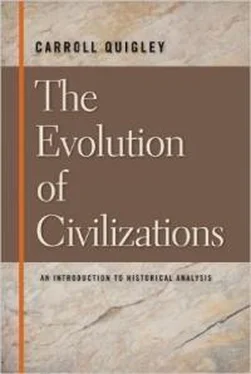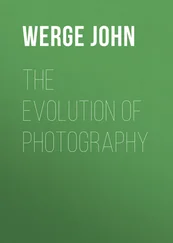The Evolution of Civilizations
Carroll Quigley
Paperback:444 pages
Publisher:Liberty Fund Inc.; 2nd edition (August 1, 1979)
Language:English
ISBN-10:0913966576
ISBN-13:978-0913966570

Table of Content
Foreword By Harry J. Hogan
Preface to the First Edition
1. Scientific Method and the Social Sciences
2. Man and Culture
3. Groups, Societies, and Civilizations
4. Historical Analysis
5. Historical Change in Civilizations
6. The Matrix of Early Civilizations
7. Mesopotamian Civilization
1. Mixture
2. Gestation
3. Expansion
4. The Age of Conflict
8. Canaanite and Minoan Civilizations
A. Canaanite Civilization
1. Mixture
2. Gestation
3. Expansion
4. Conflict and Empire
5. Decay and Invasion
B. Minoan Civilization
1. Mixture
2. Gestation
3. Expansion
4. Conflict and Universal Empire
5. Decay and Invasion
9. Classical Civilization
1. Mixture
2. Gestation
3. Expansion
4. Age of Conflict
5. Universal Empire
6. Decay
7. Invasion
10. Western Civilization
1. Mixture
2. Gestation
3. Expansion
4. Conflict
5. Second Expansion
6. Second Age of Conflict
7. Third Age of Expansion
8. Third Age of Conflict
Conclusion
Selective Bibliography By William Marina
Books
Articles
Notes

In this perceptive look at the factors behind the rise and fall of civilizations, Professor Quigley seeks to establish the analytical tools necessary for understanding history. He examines the application of scientific method to the social sciences, then establishes his historical hypotheses. He poses a division of culture into six levels, from the more abstract to the more concrete—intellectual, religious, social, political, economic, and military—and he identifies seven stages of historical change for all civilizations: mixture, gestation, expansion, conflict, universal empire, decay, and invasion. Quigley tests these hypotheses by a detailed analysis of five major civilizations: the Mesopotamian, the Canaanite, the Minoan, the classical, and the Western.
"He has reached sounder ground than has Arnold J. Toynbee" —Christian Science Monitor. "Studies of this nature, rare in American historiography, should be welcomed. Quigley's juxtaposition of facts in a novel order is often provocative, and his work yields a harvest of insights"—American Historical Review. "Extremely illuminating" —Kirkus Reviews. "This is an amazing book … . Quigley avoids the lingo of expertise; indeed, the whole performance is sane, impressively analytical, and well balanced"—Library Journal.
CARROLL QUIGLEY taught the history of civilization at the Georgetown School of Foreign Service, and was the author of Tragedy and Hope: The World in Our Time.
Foreword By Harry J. Hogan
The Evolution of Civilizations expresses two dimensions of its author, Carroll Quigley, that most extraordinary historian, philosopher, and teacher. In the first place, its scope is wide-ranging, covering the whole of man's activities throughout time. Second, it is analytic, not merely descriptive. It attempts a categorization of man's activities in sequential fashion so as to provide a causal explanation of the stages of civilization.
Quigley coupled enormous capacity for work with a peculiarly "scientific" approach. He believed that it should be possible to examine the data and draw conclusions. As a boy at the Boston Latin School, his academic interests were mathematics, physics, and chemistry. Yet during his senior year he was also associate editor of the Register, the oldest high school paper in the country. His articles were singled out for national awards by a national committee headed by George Gallup.
Dr. Hogan, now retired, has been a professor, administrator, and lawyer. He received his B.A. magna cum laude from Princeton University, his LL.B. from Columbia Law School, and his Ph.D. in American history from George Washington University. His articles have appeared in the American Bar Association Journal, the Journal of Politics, and other periodicals.
At Harvard, biochemistry was to be his major. But Harvard, expressing then a belief regarding a well-rounded education to which it has now returned, required a core curriculum including a course in the humanities. Quigley chose a history course, "Europe Since the Fall of Rome." Always a contrary man, he was graded at the top of his class in physics and calculus and drew a C in the history course. But the development of ideas began to assert its fascination for him, so he elected to major in history. He graduated magna cum laude as the top history student in his class.
Quigley was always impatient. He stood for his doctorate oral examination at the end of his second year of graduate studies. Charles Howard McIlwain, chairman of the examining board, was very impressed by Quigley's answer to his opening question; the answer included a long quotation in Latin from Robert Grosseteste, bishop of Lincoln in the thirteenth century. Professor McIlwain sent Quigley to Princeton University as a graduate student instructor.
In the spring of 1937 I was a student in my senior year at Princeton. Quigley was my preceptor in medieval history. He was Boston Irish; I was New York Irish. Both of us, Catholics adventuring in a strangely Protestant establishment world, were fascinated by the Western intellectual tradition anchored in Augustine, Abelard, and Aquinas that seemed to have so much more richness and depth than contemporary liberalism. We became very close in a treasured friendship that was terminated only by his death.
In the course of rereading The Evolution of Civilizations I was reminded of the intensity of our dialogue. In Quigley's view, which I shared, our age was one of irrationality. That spring we talked about what career decisions I should make. At his urging I applied to and was admitted by the Harvard Graduate School in History. But I had reservations about an academic career in the study of the history that I loved, on the ground that on Quigley's own analysis the social decisions of importance in our lifetime would be made in ad hoc irrational fashion in the street. On that reasoning, finally I transferred to law school.
In Princeton, Carroll Quigley met and married Lillian Fox. They spent their honeymoon in Paris and Italy on a fellowship to write his doctoral dissertation, a study of the public administration of the Kingdom of Italy, 1805-14. The development of the state in western Europe over the last thousand years always fascinated Quigley. He regarded the development of public administration in the Napoleonic states as a major step in the evolution of the modern state. It always frustrated him that each nation, including our own, regards its own history as unique and the history of other nations as irrelevant to it.
Читать дальше












